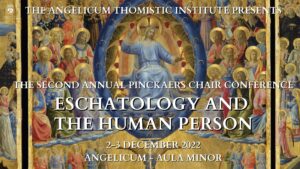The Way is the End: Aquinas on Human Acts as ad finem
Michael Sherwin, OP
Angelicum Thomistic Institute, Aquinas Professor
Michael S. Sherwin, O.P. is Professor of Fundamental Moral Theology, director of the Institute of Spirituality here at the Angelicum, and the Aquinas Professor at the Pontifical University of St. Thomas Aquinas. Fr. Sherwin comes to the Angelicum after almost twenty years of teaching at the University of Fribourg, Switzerland. He has also taught at the Dominican School of Philosophy and Theology in Berkeley, California, where he received his initial formation as a Dominican and was ordained a priest in 1991. Author of articles on the psychology of love, virtue ethics and moral development, his monograph, By Knowledge and By Love: Charity and Knowledge in the Moral Theology of St. Thomas Aquinas (CUA Press, 2005) has become a standard Thomistic reference, while Alasdair MacIntyre has described Fr. Sherwin’s published collection of essays, On Love and Virtue (Emmaus Academic, 2018) as “theological reflection at its best.”
“The Way is the End: Aquinas on Human Acts as ad finem”
Thomas Aquinas follows Augustine and the Tradition in affirming the core Christian truth that we are all wayfarers (viatores) on earth, travelling toward our eternal homeland in heaven. Nevertheless, St. Thomas also affirms that the Christian life already participates in an incipient and hidden way in the eternal life of the celestial kingdom. Specifically, good human acts are by their nature ad finem and thus participate in the end itself. In this sense, the way is the end. As elevated by God’s grace, these acts produce the joys proper to the fruits of the Holy Spirit, which when perfected are the Beatitudes. St. Thomas asserts that the felicity caused by these acts of perfect virtue are a “certain imperfect beginning of future beatitude” (ST I-II 69.2), even though they exist in the presence of the sufferings proper to this present life. In this way, the Christian participates in the life of Christ, who is both the way and the end. This talk briefly traces Thomas Aquinas’s account of these graced mysteries.
Related Content




